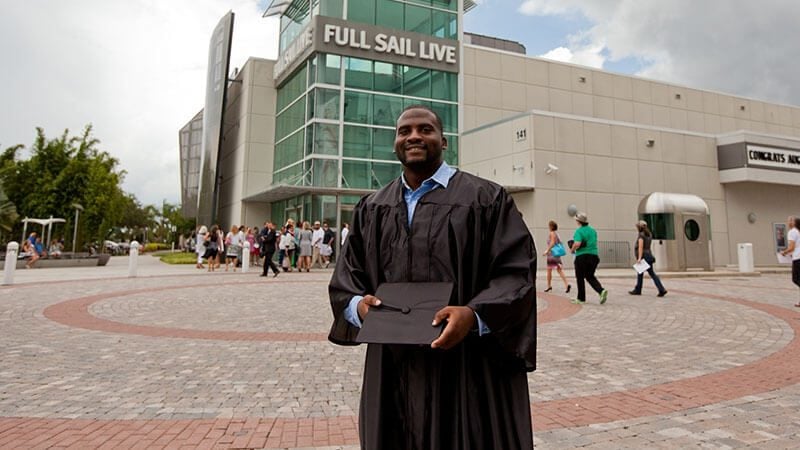Full Sail
Can I Work While Attending Full Sail?
One of the most unique things about Full Sail University is our accelerated, project-based curriculum. If you’re willing to work hard, you can get a degree in about half the time it would take at a traditional university. Because of the fast-paced nature of the programs, prospective students might have concerns about balancing a part-time job while attending a round-the-clock campus. However, Full Sail students do have options when it comes to finding work. By following a few guidelines and utilizing various support systems, most students can find success in their degree program while managing to make a little money (and gain some experience) in the process.
School comes first
The duration of most courses at Full Sail is four weeks, meaning a single absence accounts for a much greater percentage of overall class time. Because of the unique nature of the curriculum, Full Sail’s attendance policy is more robust than those found at other schools. Students receive a new schedule every month, so working in part-time industries like retail and food service might not be the best fit for members of the Full Sail community.
“Students are allowed to miss ten percent of a class without penalty,” says Jessica Henlon, Director of Student Advising. “If they miss more than ten percent but less than 20 percent, they’re required to submit documentation explaining their absence, and they have to complete make-up assignments and labs to pass. If the absence accounts for more than 20 percent of the class, we require them to retake the course.”
With that in mind, it’s important to remember the reason you enrolled in the first place – to gain real-world experience in a subject you’re passionate about. Like any professional commitment, success is directly tied to attendance, which means school has to come first.
If you’re looking for work, try finding it on campus
As an accredited institution, Full Sail is able to employ students under the Federal Work-Study Program, which provides part-time jobs to students to help them offset educational costs. The program is run through the Financial Aid department, and applicants will need to submit documentation and financial records to determine eligibility. Students must complete their first month of classes before applying, and they must maintain a certain GPA during their tenure as a work-study.
Once a student is approved as a work-study, they’re granted access to a list of available jobs on campus – everything from serving as a peer tutor in the campus writing center to working with Full Sail’s in-house creative agency. From there, they can choose to apply to whichever jobs interest them. Because Full Sail believes in providing students with real-world experience, this process works just like it does after graduation. Students submit a resumé, undergo an interview, and are hired based on their enthusiasm and expertise.
Freelance equals flexibility and experience
Contract work is an excellent option for Full Sail students looking to make a little extra money and gain some experience in the process.
Show Production graduate Andrew Ellis decided to maximize his experience as a student by volunteering to work production for special events like Hall of Fame and Full Sail’s monthly Behind the Scenes Tour. The experience he obtained as a volunteer allowed him to make a pivot into freelance work.
“I took what I’d learned and started producing live audio at a few churches in town,” he says. “I rarely had classes on Sunday, so I would put in six to eight hours over the course of a day, and earn a little extra money for the week.”
Another opportunity came in the form of Feherty the Emmy-nominated talk show hosted by David Feherty and produced by the Golf Channel, a subsidiary of NBC Sports. The show films its intro and outros on campus, and Andrew had the chance to work one of the production sessions as a student.
“I kept in contact after that first job,” says Andrew, who also has a full-time job as a lead tech with corporate production company PSAV. “I’ve been asked back to work on Feherty twice since graduating. It’s nice to have NBC on my resumé because they’re a big name in the industry, and they pay well and take care of their crew.”
Your advisors and instructors may be willing to work with you – if you’re up front with them
Full Sail employs a team of academic advisors who are deeply invested in supporting the goals and needs of each student. They understand that these needs vary based on a person’s unique situation and will often provide counsel and options to students who are struggling to balance a job and a full course load.
“We sometimes encourage students who work to reduce their load,” says academic advisor Paula Ramirez. “We offer two types of scheduling tracks – accelerated, which is two classes per month, and extended, which is one class per month. A student who is on the extended track might be able to work part-time a few days a week.”
Andrew remembers working with his instructors and advisor to make time for freelance opportunities that provided him with experience in show production.
“As long as I cleared it with them beforehand and got my work done, my teachers were willing to work with me. They wanted me to build my resumé, especially toward the end of my program. So if a job opportunity came up, I would try to maximize my time in class and get everything done ahead of time. That way, if I needed to take a day to work a production job, I wasn’t missing out on anything crucial,” he says.
“Our students are some of the most creative people looking to break into entertainment and media,” adds Paula. “We encourage them to think creatively when it comes to finding a job that works for them as a student.”
Whether you’re ready to apply or just want to learn more about Full Sail University, our Admissions Representatives are here to help. Call us or request more information.
Keep Exploring
- Computer Animation
- Graphic Design
- Emerging Technologies
- Interactive
- Course Info
- E-book
- Media Communications
- Information Technology
- Campus
- Creative Writing
- Housing
- Game Design
- Game Business & Esports
- Sportscasting
- Sports Marketing & Media
- Our Grads
- Digital Cinematography
- Government
- Image Gallery
- Expert Advice
- Cybersecurity

